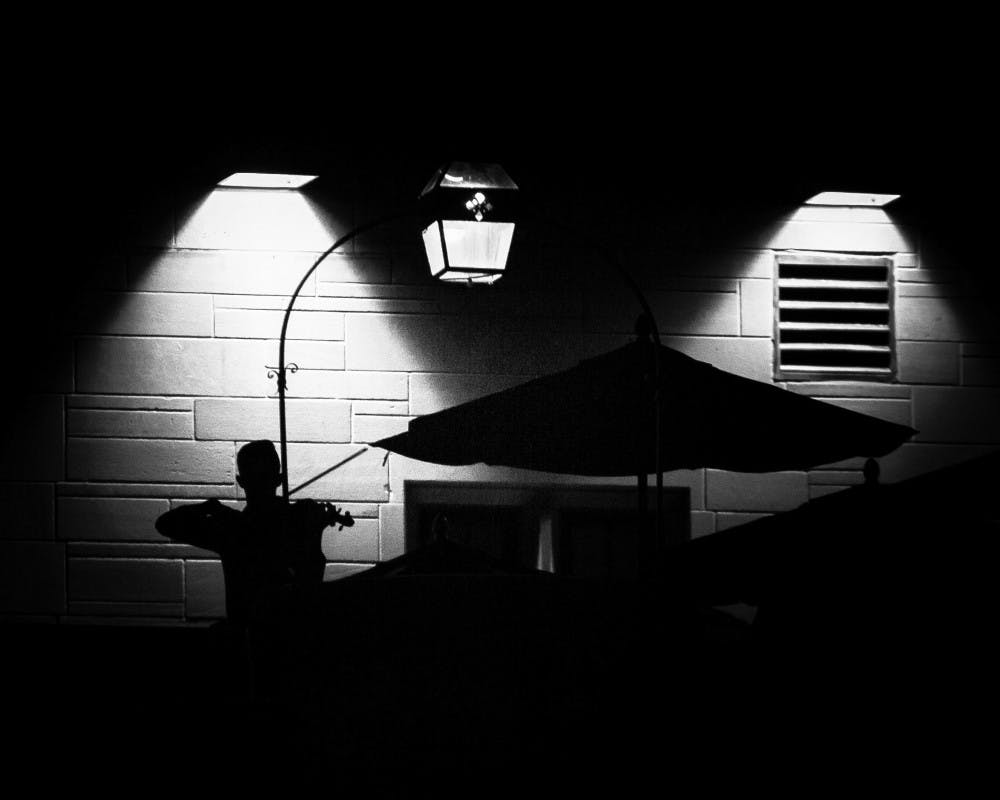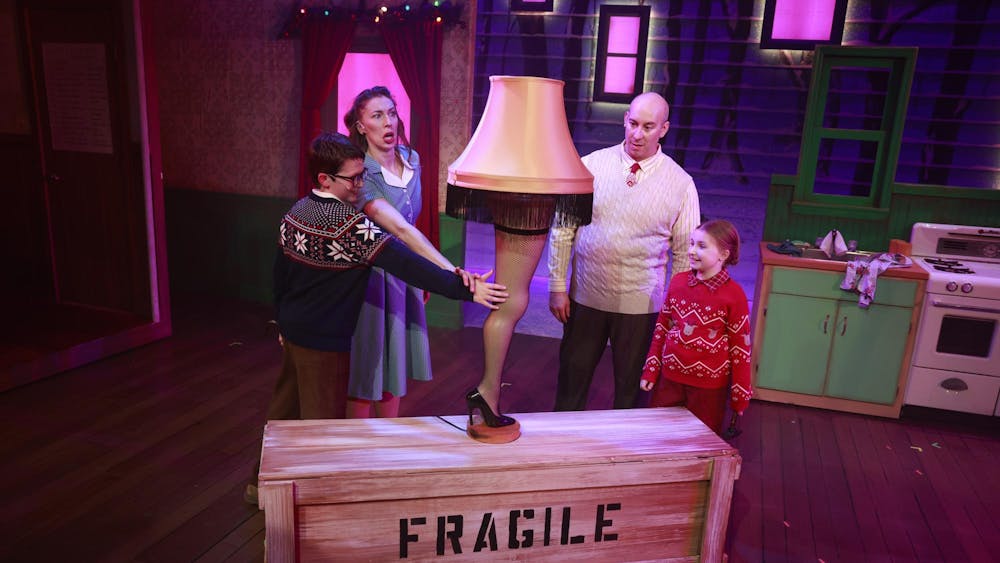He hopes that tonight they’ll come to him.
It’s a little past 11 p.m., and his silhouette is illuminated by a light overhead outside the Indiana Memorial Union. He stands on one of the lower levels outside the building. Hours earlier, the space was filled with people chatting and eating between classes. It’s empty now— the tables abandoned, the umbrellas deserted, the conversations forgotten. He’s alone.
There are some cars driving by, a few people milling about this corner of campus. He rests his chin on the varnished wood of his violin, now perched on his shoulder, and begins to play.
He’s chosen the theme from "Schindler’s List." He likes the acoustics here, the way the mournful notes bounce off the brick. Maybe it will be enough to make someone stop. That’s why he does this, why he goes on campus to play outside at night. He just wants someone to talk to him.
Instead, the few souls outside the IMU walk past him. Many don’t look at all, chatting with friends as they wait for the bus, walking away, back to houses and apartments and lives of their own.
Dietrich Hartzog plays to himself.
***
Dietrich, 21, isn’t a student in the Jacobs School of Music, or one at Indiana University at all. He's applying to be a visiting student at IU starting in the spring, taking classes but not working toward a degree.
Despite studying violin performance since the age of 5, he disagrees with the way Jacobs teaches music. It's too mathematical, he said, and not there isn't enough room for the emotion behind the music.
“I can’t play music and not be connected to it somehow,” he said. “If not, they’re just notes flat on the page.”
He spends most of his days at Fairview United Methodist Church from 10 a.m. to 11 p.m. working on finishing his high school diploma through an online program. His father, George Hartzog III, became the priest there two years ago.
Dietrich said he doesn’t want to become a priest, but for now, he helps his father at the church. He’s the only one here now, footsteps echoing through the empty sanctuary as he comes in early to set up a projector for the church’s logo. When the long-time parishioners come, he’ll greet them as they file in before George’s sermon begins. But mostly, he is the musical accompaniment to his father’s service, playing hymns on the violin in planned pauses in the sermon.
As George preaches, Dietrich listens and rests his violin on his thigh. He sits in the musicians’ section of the church, a third of the seats reserved for three people: Dietrich, organist Travis Whaley and Whaley’s boyfriend.
George asks the congregation, “Do you take time to listen to Jesus?”
Dietrich sits in front, waiting. Later, his cue comes. He hops up and plays a solo, the notes companionless, the only sound in the sanctuary. When he’s done, he sits back down in his row of one. George resumes, this time addressing the big man himself.
“We come into the quiet of this moment to be in your presence,” he said. “There are so many words and so much sound it’s so hard with the business of our lives to listen to you. Help us when that din is broken that we may feel and hear you again.”
The congregation members, growing smaller and more wrinkled with each passing year, puts their heads down and closes their eyes as they pray.
The average age for a parishioner, Dietrich guesses, is 70.
These are the people Dietrich spends his time with. The online schooling was necessary as he was a target for bullies in almost every brick-and-mortar school he attended growing up.
In the fourth grade, it was apparently because his tighty-whities weren’t manly enough for his classmates. Another year, he said it was because he wore gray jeans while everyone else wore blue. His parents finally pulled him out of school after years of being cast aside.
When Dietrich’s father gives a sermon, he’s addressing the congregation. But he’s also speaking to his son.
“Let me tell you about someone who was bullied – Jesus,” George says in another part of the service. “You’re a son of God. You’re a child of God. And nobody can take that away from you.”
It’s not just a sermon. That’s what he told his son years ago, when Dietrich was going through the worst of it.
Taking Dietrich out of school was a necessity at the time, but it means that he doesn’t have a lot of friends his own age now. He wants to change that. Performing at the IMU didn’t work out, but he has another plan: he'll soon be taking his violin to the lawn of the Monroe County Courthouse.
Maybe they’ll come to him that way.
***
Dietrich knew he wanted to be a violinist when he was 4 years old, after seeing a Joshua Bell performance on television. He liked how passionate Bell looked when he performed, how he moved with the music. For a full year before his parents bought him an actual violin, he mimicked the motions with a screwdriver and hammer.
From the ages of 5 to 18, he studied violin performance under different teachers in Bloomington and, for a time, Chicago when the family temporarily relocated there. He’s played in three youth orchestras, even conducting one at the age of 14. He hasn’t been in an orchestra for a couple years, and he said he feels himself growing rusty.
He likes to practice in the church when he’s alone, when he’s the only one to hear his music. The main chamber of the building, large and with vaulted ceilings, makes for good acoustics as sound fills the empty room. One morning, when practicing “And The Waltz Goes On,” he makes a mistake. The note sours. The waltz stops.
“Whoops,” he says. “I’m not cooking today yet. I’m on simmer setting.”
Since he doesn’t want to pursue a career in violin performance, a sour note here and there isn’t the end of the world. But he says it doesn’t feel great to be left behind: on a recent jam session with a musician acquaintance, Dietrich just couldn’t keep up.
The hymns aren’t hard to play, though, and music is more of a spiritual experience for him than it is a professional calling. He believes in the music of the spheres, an ancient philosophy describing the movement of heavenly bodies in a sort of harmony.
But he takes it a step further. Scientists have found that signals that radiate from planets can be converted into sound, unique from planet to planet.
To Dietrich, they’re more than the hums and pops of magnetic fields millions of miles away: they’re music. In the empty vacuum of the universe, the planets sing.
***
On Sunday mornings, hours before the congregation appears for service, Dietrich studies up on the songs he’ll perform that day. He likes to know the history behind the song so his performance is more informed. Today, one of the hymns is “Praise to the Lord, the Almighty,” an English version of a German hymn from the late 1600s.
It’s a dramatic, sweeping song, so he decides that he’ll emphasize the downbeats to make it more forceful. He practices it now, alone in the church to an audience of plush red carpet and hardwood floors. Morning sunlight filters in through stained-glass windows. The notes, sharp and clear, ring through the empty room.
When he plays it during the service, he’ll have to compete with the booming organ and the voices of the congregation. The violin part is a little hard to hear in the crowd, but 88-year-old parishioner Phyllis Fraser focuses on it every Sunday.
There it is.
And suddenly, it's a wonder no one was listening.






